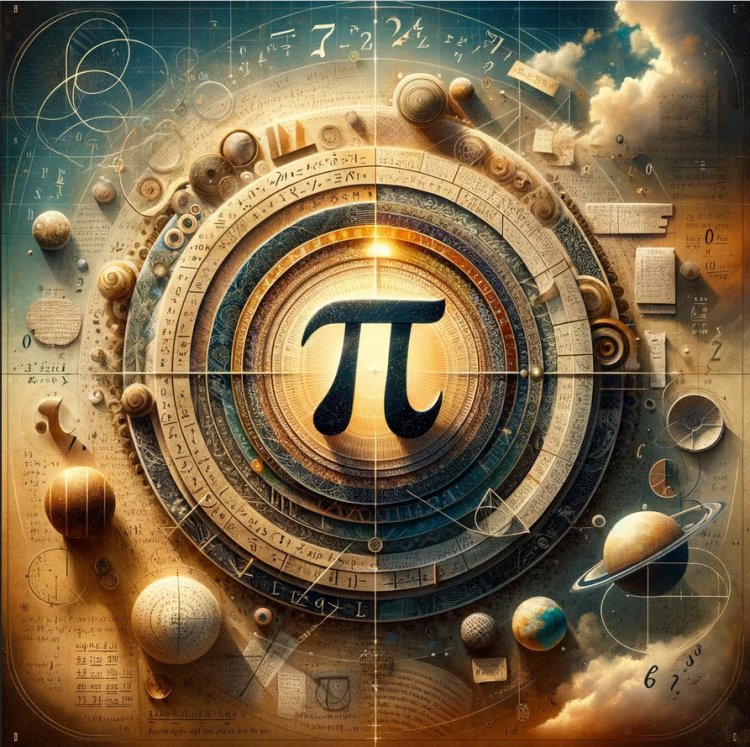The Enigmatic Number: Unraveling the Mysteries of Pi (π)
Mathematics is a language that describes the universe in its most abstract forms, and at the heart of this language lies a number so fundamental yet so mysterious: Pi (π). This transcendental number, known for its infinite, non-repeating decimal representation, has fascinated mathematicians, scientists, and enthusiasts alike for centuries. In this blog, we will explore the history, significance, and applications of π, diving into why this number continues to captivate and intrigue us.

What is Pi (π)?
Pi (π) is the ratio of the circumference of a circle to its diameter. It is a constant number, meaning that for all circles of any size, π will always be the same. The value of π is approximately 3.14159, but its decimal representation extends infinitely without repetition or pattern, a fact that has intrigued mathematicians for millennia.
A Journey Through History
The quest to understand and approximate π has been a significant part of mathematical history. The ancient Egyptians and Babylonians had their approximations, understanding the concept of this ratio even if they didn't have the number we recognize today. Archimedes of Syracuse (287-212 BC) made one of the first calculated approaches to π, using the perimeters of inscribed and circumscribed polygons to approximate its value.
Over the centuries, the quest to calculate π more accurately has involved mathematicians from all over the world, including the likes of Zu Chongzhi in China, who gave one of the most accurate ancient approximations of π, and Ludolph van Ceulen in Europe, who spent much of his life calculating π to 35 decimal places.
Pi in Mathematics and Beyond
Pi (π) is not just a curiosity; it's a cornerstone of modern mathematics and physics. It appears in various fundamental formulas, from calculating the area of a circle (πr^2) to Euler's identity, which combines five of the most important numbers in mathematics (e, i, π, 1, and 0) in a single equation. π also surfaces in the fields of statistics, probability theory, and calculus, demonstrating its versatility and importance.
The Significance of Pi Day
Every year, Pi Day is celebrated on March 14th (3/14), echoing the first three digits of π. This day is not just a celebration of π but also of mathematics and its role in understanding the universe. Pi Day activities often include pie-eating contests, discussions on the significance of π, and attempts to memorize its digits, highlighting both the fun and profundity of mathematics.
Unraveling the Mysteries
Despite its ancient origins, π still holds mysteries today. The question of whether π contains every possible number sequence within its infinite decimals remains open. This property, known as normality, has not been proven for π, adding to its enigmatic nature.
Furthermore, π's status as an irrational number (it cannot be expressed as a fraction of two integers) and a transcendental number (it is not the root of any non-zero polynomial equation with rational coefficients) places it in a special category of numbers that transcend algebraic description.
Applications of Pi
The applications of π extend far beyond the realm of theoretical mathematics. In engineering, π is essential in designing anything circular or spherical, from wheels and gears to planets and satellites. In physics, π plays a critical role in the laws of motion, electromagnetism, and quantum mechanics. Even in the digital world, algorithms that calculate π's digits are used to test the performance of computers and the accuracy of numerical computation methods.
Conclusion
Pi (π) is more than just a number; it's a symbol of the mathematical quest to understand the universe. Its infinite nature and appearance across various scientific disciplines make it a source of endless fascination. As we continue to explore mathematics and the world around us, π serves as a reminder of the beauty and mystery inherent in the pursuit of knowledge. Whether you're a seasoned mathematician or a curious mind, the story of π is a testament to humanity's enduring quest to decipher the language of the universe.
What's Your Reaction?
















